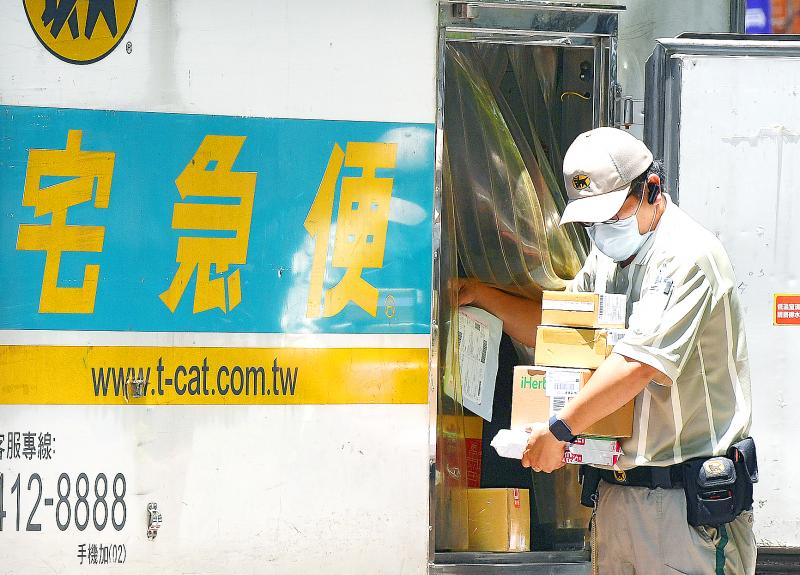Several hypermarket and convenience store chains have temporarily suspended deliveries of frozen and chilled products, as delivery service providers face skyrocketing demand amid a COVID-19 outbreak.
Among chains that announced service stoppages was Hi-Life International Co Ltd (萊爾富), which on Tuesday said that deliveries of the products via Taiwan Pelican Express Co (台灣宅配通) would be halted through Saturday.
Hi-Life home deliveries by HCT Logistics Co (新竹物流) would be suspended until June 15, while those by Taiwan S.F. Express Co Ltd (順豐速運) would be suspended in certain districts in New Taipei City and Taipei during an unspecified period, the company said.

Photo: Liao Cheng-hui, Taipei Times
President Chain Store Corp (統一超商), which operates the 7-Eleven convenience store chain, said that refrigerated and frozen deliveries by courier service T-Cat (黑貓宅急便) would be suspended through today.
In-store pickup services would not be affected, it added.
Hypermarket chain A-Mart (愛買) said that some of its cold shipping services handled by T-Cat would also be suspended through today, adding that other types of deliveries would remain unaffected.
Costco Wholesale Taiwan Ltd (台灣好市多) said that refrigerated deliveries to rural areas handled by Kerry TJ Logistics Co (嘉里大榮物流) could see delays, while those to urban areas are expected to run smoothly.
An exception to the delays was Carrefour Taiwan (家樂福), which said that its cold deliveries — handled by an in-house courier service and four contracted firms — would continue to run on schedule.
The shipping delays come after several Taiwanese courier services on Tuesday announced partial service cuts in response to what they said was an unprecedented level of demand.
In a statement, T-Cat said that it would suspend cold deliveries in Taipei, New Taipei City, Taoyuan and Hsinchu City, as well as nationwide deliveries of products from 7-Eleven and OK Mart (來來) convenience stores through today.
The firm also said it would be unable to ensure next-day delivery of uninsured packages through June 14.
A T-Cat spokesman said that the company plans to review the suspensions daily based on the level of demand, considering its ability to provide good service quality and guaranteeing the well-being of its employees.
HCT Logistics said that it would halt cold deliveries to Taipei, New Taipei City, Keelung, Taoyuan and Hsinchu, as well as nationwide deliveries of products from Hi-Life convenience stores through tomorrow.

Japanese technology giant Softbank Group Corp said Tuesday it has sold its stake in Nvidia Corp, raising US$5.8 billion to pour into other investments. It also reported its profit nearly tripled in the first half of this fiscal year from a year earlier. Tokyo-based Softbank said it sold the stake in Silicon Vally-based Nvidia last month, a move that reflects its shift in focus to OpenAI, owner of the artificial intelligence (AI) chatbot ChatGPT. Softbank reported its profit in the April-to-September period soared to about 2.5 trillion yen (about US$13 billion). Its sales for the six month period rose 7.7 percent year-on-year

CRESTING WAVE: Companies are still buying in, but the shivers in the market could be the first signs that the AI wave has peaked and the collapse is upon the world Taiwan Semiconductor Manufacturing Co (TSMC, 台積電) yesterday reported a new monthly record of NT$367.47 billion (US$11.85 billion) in consolidated sales for last month thanks to global demand for artificial intelligence (AI) applications. Last month’s figure represented 16.9 percent annual growth, the slowest pace since February last year. On a monthly basis, sales rose 11 percent. Cumulative sales in the first 10 months of the year grew 33.8 percent year-on-year to NT$3.13 trillion, a record for the same period in the company’s history. However, the slowing growth in monthly sales last month highlights uncertainty over the sustainability of the AI boom even as

AI BOOST: Next year, the cloud and networking product business is expected to remain a key revenue pillar for the company, Hon Hai chairman Young Liu said Manufacturing giant Hon Hai Precision Industry Co (鴻海精密) yesterday posted its best third-quarter profit in the company’s history, backed by strong demand for artificial intelligence (AI) servers. Net profit expanded 17 percent annually to NT$57.67 billion (US$1.86 billion) from NT$44.36 billion, the company said. On a quarterly basis, net profit soared 30 percent from NT$44.36 billion, it said. Hon Hai, which is Apple Inc’s primary iPhone assembler and makes servers powered by Nvidia Corp’s AI accelerators, said earnings per share expanded to NT$4.15 from NT$3.55 a year earlier and NT$3.19 in the second quarter. Gross margin improved to 6.35 percent,

FAULTs BELOW: Asia is particularly susceptible to anything unfortunate happening to the AI industry, with tech companies hugely responsible for its market strength The sudden slump in Asia’s technology shares last week has jolted investors, serving as a stark reminder that the world-beating rally in artificial intelligence (AI) and semiconductor stocks might be nearing a short-term crest. The region’s sharpest decline since April — triggered by a tech-led sell-off on Wall Street — has refocused attention on cracks beneath the surface: the rally’s narrow breadth, heavy reliance on retail traders, and growing uncertainty around the timing of US Federal Reserve interest-rate cuts. Last week’s “sell-off is a reminder that Asia’s market structure is just more vulnerable,” Saxo Markets chief investment strategist Charu Chanana said in